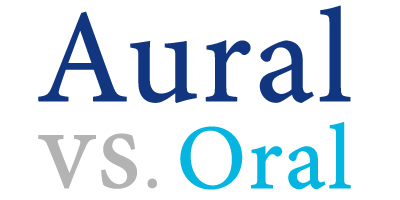In English, words that sound the same but mean different things are called homophones. English has many homophones, and they all have the potential to confuse someone who might not recognize the difference.
The words aural and oral are technically near homophones, rather than true homophones. Nonetheless, when not pronounced clearly, they can sound identical.
Since aural and oral refer to different sensory faculties, it’s important to use them correctly, so you can avoid a potentially embarrassing mistake.
What is the Difference Between Aural and Oral?
In this post, I will compare aural vs. oral. I will use each word in a sentence to illustrate its proper context, and I will explain a helpful trick to use when you can’t decide whether to choose oral or aural for your own writing.
When to Use Aural
 What does aural mean? Aural is an adjective that means related to ears or the sense of hearing.
What does aural mean? Aural is an adjective that means related to ears or the sense of hearing.
Mr. McBurney and his ace sound designers, Gareth Fry and Pete Malkin, have created an aural labyrinth of many layers. –The New York Times
It’s important to distinguish aural from auditory, a similar adjective.
Auditory refers to sound or the sense of hearing, but not the ears themselves.
In the following sentence, aural and auditory could be used interchangeably.
- The patient listened to music as auditory stimulation during rehab sessions.
- The patient listened to music as aural stimulation during rehab sessions.
Since the music stimulated the patient’s ears, aural is appropriate. Music is a form of sound, so auditory also fits.
In the next sentence, only aural is correct.
- The patient received cochlear implants to assist in aural functioning.
This time, the sentence refers to the functioning of the ears themselves, so auditory would be an imprecise choice of words. Only aural is correct.
When to Use Oral
 What does oral mean? Oral is also an adjective. It means related to the mouth.
What does oral mean? Oral is also an adjective. It means related to the mouth.
Since the mouth is used for many things, oral is used in many contexts, including dentistry, speech language pathology, and others.
For example,
- Tania has excellent oral hygiene.
- My doctor’s notes say this pill is an oral medication, and should be taken twice daily by mouth.
Sometimes, oral becomes a synonym for spoken and verbal, like in these sentences,
- We are a proud people, with a rich oral history and many festive traditions.
- I had to correctly pronounce many words in order to pass my oral French test.
- The U.S. Court of Appeals for the District of Columbia Circuit will hear several hours of oral argument Tuesday on the power-plant regulations. –The Wall Street Journal
Trick to Remember the Difference
 It’s easy to remember whether oral or aural is correct, and here is a helpful trick to remember oral vs. aural.
It’s easy to remember whether oral or aural is correct, and here is a helpful trick to remember oral vs. aural.
Oral refers to the mouth or speech. Both oral and mouth are spelled with an O.
Aural refers to the ears. Neither aural nor ears contains an O. Keeping these words straight is as simple as remembering how each is spelled.
Summary
Is it aural or oral? Aural and oral are both adjectives, but each has its own separate meaning.
- Aural means related to the ears.
- Oral means related to the mouth.
Since both of these words are used in connection to the senses we use every day, it’s easy to get them mixed up. You can remember which is which by thinking about how these words are spelled.
Always remember that you can check this website any time you need to refresh your memory.
Contents
